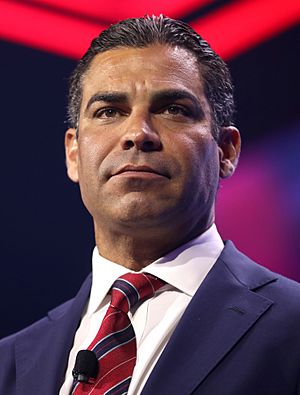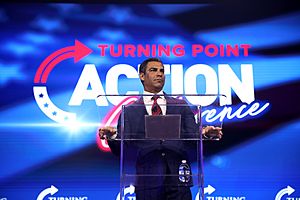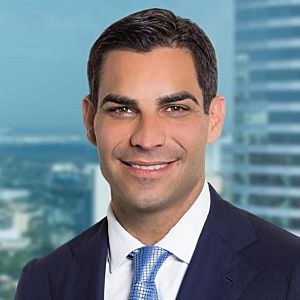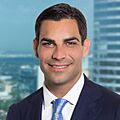Francis Suarez facts for kids
Quick facts for kids
Francis Suarez
|
|
|---|---|

Suarez in 2023
|
|
| 43rd Mayor of Miami | |
| Assumed office November 15, 2017 |
|
| Preceded by | Tomás Regalado |
| 80th President of the United States Conference of Mayors | |
| In office January 2022 – June 2023 |
|
| Preceded by | Nan Whaley |
| Succeeded by | Hillary Schieve |
| Member of the Miami City Commission from the 4th district |
|
| In office November 25, 2009 – November 15, 2017 |
|
| Preceded by | Tomás Regalado |
| Succeeded by | Manolo Reyes |
| Personal details | |
| Born |
Francis Xavier Suarez
October 6, 1977 Miami, Florida, U.S. |
| Political party | Republican |
| Spouse | Gloria Fonts |
| Children | 2 |
| Relatives | Xavier Suarez (father) Alex Mooney (first cousin) |
| Education | Florida International University (BBA) University of Florida (JD) |
Francis Xavier Suarez (born October 6, 1977) is an American lawyer and politician. He has been the 43rd mayor of Miami since 2017. He is a member of the Republican Party. Before becoming mayor, he served on the Miami City Commission from 2009 to 2017. His father, Xavier Suarez, was also a mayor of Miami.
Suarez studied at Florida International University (FIU), where he earned a degree in finance. He then earned a law degree from the University of Florida in 2004. He was first elected to the Miami City Commission in 2009. He was re-elected in 2011 and 2015. In 2017, he was elected mayor of Miami. He was re-elected in 2021. As mayor, Suarez has supported cryptocurrency.
Suarez ran for president in the 2024 Republican Party presidential primaries. However, he stopped his campaign when he did not qualify for the first debate.
Contents
Early Life and Education
Francis Suarez is the oldest of four children. His parents are Rita and Xavier Suarez, who also served as Miami's mayor two times. His aunt, Lala, is the mother of U.S. Congressman Alex Mooney.
Suarez went to Immaculata-LaSalle High School. He graduated in 1996. He then attended Florida International University (FIU), where he earned a bachelor's degree in finance. He was among the top students in his class. After college, Suarez went to the University of Florida Fredric G. Levin College of Law. He earned his law degree in 2004.
Legal Career
After law school, Suarez became a lawyer. He worked for the law firm Greenspoon Marder. He focused on business and real estate deals.
In 2021, Suarez joined a new office of the law firm Quinn Emanuel Urquhart & Sullivan in Miami. Being mayor of Miami is a part-time job. This is because the mayor has limited duties and powers.
Early Political Steps
Before working in city government, Suarez was involved in his local homeowner association. He decided to get involved after his home was robbed.
Miami City Commissioner (2009–2017)
Suarez was first elected to the Miami City Commission in 2009. He won the District 4 seat in a special election. This election was held after the previous commissioner, Tomás Regalado, resigned to become mayor.
The first round of voting happened on November 3, 2009. Suarez received 44.74% of the votes. He then went to a second round of voting, called a runoff election, against Manolo Reyes. The runoff election was on November 17, 2009. Suarez won with 51.41% of the votes. He was re-elected without opposition in 2011 and 2015.
In 2013, the Miami Herald newspaper reported on Suarez's work as a commissioner. He helped pass a motion that lowered city employees' salaries. He also supported changes to the city's zoning code. These changes aimed to make it easier to build affordable housing. However, Suarez tried but failed to change Miami's government. He wanted to move from a "weak mayor" system to a "strong mayor" system. In a weak mayor system, the mayor has limited power. In a strong mayor system, the mayor has more control over the city's daily operations.
Suarez was initially a close supporter of Mayor Regalado. In late 2011, Regalado asked Suarez to lead the City Commission. Suarez even supported a motion to fire Police Chief Miguel Exposito, which the commission passed. However, by mid-2012, Suarez began to criticize Regalado's leadership. He pointed out many staff changes and questioned the city's budget. Suarez then announced he would run against Regalado in the 2013 mayoral election. Suarez also opposed red light cameras in the city.
2013 Mayoral Campaign
Suarez was expected to challenge Mayor Tomás Regalado in the November 2013 mayoral election. He raised a lot of money for his campaign in late 2012. His campaign raised $460,000, which was much more than Regalado's $160,000. Many important people supported Suarez, including former Miami mayor Manny Diaz.
On January 15, 2013, Suarez officially announced he was running for mayor. He held a press conference outside his home. His father attended and supported his campaign. Suarez promised to provide "forward-thinking and innovative" leadership. His campaign focused on increasing the city's emergency funds, helping small businesses, strengthening the Miami Police Department, and making Miami more famous nationally.
Political experts thought the election would be very close. Even with strong fundraising, Suarez was seen as the underdog because Regalado was popular. Suarez's age was also a concern for some, as he was 30 years younger than Regalado. However, Suarez said his campaign was "an opportunity for our generation to take a leadership role."
During his campaign, some of Suarez's staff faced issues. These issues led Suarez to end his campaign on August 26, 2013. He mentioned "mistakes" made by his campaign team as a reason.
Mayor of Miami (2017-Present)
Suarez was elected mayor of Miami in the 2017 Miami mayoral election. He was the first mayor born in Miami. He was also the first mayor not born in Cuba since 1996. Suarez was re-elected in the 2021 Miami mayoral election. He received over 78% of the votes.
Miami has a "weak mayor" system. This means the mayor has limited power. The mayor's job is part-time. The mayor does not control the city's daily operations. The mayor can veto laws passed by the city commission. They can also declare emergencies. The mayor can hire and fire the city manager. However, the city commissioners can overrule the mayor's choice. Even with limited power, Suarez has become a very well-known figure in Miami's government.
From June 2022 to June 2023, Suarez served as the president of the United States Conference of Mayors. This is a group of mayors from across the U.S.
Fortune magazine included Suarez in its 2021 list of the "World's 50 Greatest Leaders."
"Strong Mayor" Vote
As mayor, Suarez again tried to change Miami to a "strong mayor" system. In November 2018, voters rejected this change in a special election. A "strong mayor" system would give the mayor more power over city departments. Many real estate developers and lawyers supported this change. They gave over $1.2 million to Suarez's group to promote a "yes" vote.
City Development
As mayor, Suarez has overseen a $400 million bond plan. This plan is called the Miami Forever Bond. It aims to fight rising sea levels and support affordable housing. Miami has seen a lot of population growth since 2020. This has led to a shortage of affordable homes. The cost of homes in Miami increased by 48% from 2019 to 2023.
Suarez also helped get approval for Miami Freedom Park. This project includes a soccer specific stadium for Major League Soccer's Inter Miami CF. The stadium is being built on land that was a city-owned golf course.
Digitalizing City Services
Suarez has pushed to modernize Miami's city services. In 2018, the city started using an Electronic Plans Review System. This system allows people to submit building plans online. Miami also adopted the eStart system. This system helps people get building permits online. Suarez said this would make it easier for businesses to get permits. The eStart system was launched in January 2021.
Climate Change
Suarez agrees that rising sea levels are a challenge for Miami due to climate change. In February 2019, Suarez wrote an article with former United Nations Secretary-General Ban Ki-Moon. The article discussed how Miami is dealing with the effects of climate change.
In November 2019, the Miami City Commission declared a climate emergency. This was a symbolic resolution. It did not include specific actions. Suarez promised to use funds from the Miami Forever Bond to address climate issues. He also sought more state and federal funding.
Business and Economy
Marketing the City
Many people describe Suarez as Miami's "chief marketing officer." This is because his mayor's office has limited official power. In March 2024, the Financial Times said Suarez played a key role in making Miami a "glamorous global centre."
Suarez has promoted Miami as a business-friendly city with low taxes. He has called Miami the "capital of capital." Florida has no individual income tax. Miami has a low corporate income tax rate of 5.5%. Suarez has also encouraged tech and finance companies to move to Miami.
In 2022, Suarez spoke at the World Economic Forum. He also gained attention by replying to unhappy tech executives on Twitter. He would ask, "how can I help?" This became his personal catchphrase.
City Growth
Miami has seen an increase in wealth and business since the start of the COVID-19 pandemic. Florida gained many new residents between July 2020 and July 2021. Miami's population grew by 12% in 2022 and 14% in 2023. This new population included many wealthy individuals. This greatly increased local and state tax money. Suarez has tried to take credit for this economic growth. He based his 2024 presidential campaign on his claim that his leadership helped the city's economy grow.
Suarez believes that tax changes and fewer health restrictions during the pandemic helped attract people to Florida. He also thinks that more people working remotely allowed them to move to Miami.
Cryptocurrency
Suarez is a politician who supports cryptocurrency. He has promoted Miami as a center for cryptocurrency. He wants Miami to be the next Silicon Valley. He aims to bring cryptocurrency businesses to the city. He believes this will modernize Miami's economy. He even put up a "crypto bull" statue in Downtown Miami. This statue is like the famous Charging Bull statue in New York City. He also encouraged cryptocurrency conferences to be held in Miami.
In November 2021, Suarez announced he would receive his mayoral salary in Bitcoin. He still holds this Bitcoin.
Suarez supported a naming rights deal for Kaseya Center with the cryptocurrency company FTX. He appeared with Sam Bankman-Fried, the head of FTX. When FTX later faced problems and went bankrupt, the deal ended. Suarez later said his decision to support FTX "had not matured well."
In September 2021, Suarez said his goal for Miami was to remove taxes. He hoped to fund the city using a special digital coin called MiamiCoin. He also said Miami was looking into letting residents be paid and pay taxes using Bitcoin. In November 2021, Suarez became the first U.S. politician to take his salary in cryptocurrency. Less than a year after it launched, MiamiCoin lost most of its value. Suarez lost money on MiamiCoin himself. However, he continued to support cryptocurrency.
Bid for 2020 DNC
Miami, along with Miami Beach and Miami-Dade County, tried to host the 2020 Democratic National Convention (DNC). Suarez supported this effort. He believed it would bring money and attention to the city. He said it would show Miami as a center for "innovation, finance and entrepreneurship."
Miami was one of three final cities considered. The city commission passed a resolution to prepare for the DNC if Miami was chosen. However, Milwaukee was chosen instead.
Transportation
In 2021, Suarez suggested using tunnels to ease traffic in Miami. He saw the Las Vegas Loop built by Elon Musk's company. He proposed a tunnel system to connect different parts of Miami.
Miami has seen a lot of population growth since the COVID-19 pandemic. This has made traffic congestion worse. In 2024, Miami was ranked as one of the worst cities in the world for traffic.
Miami-Dade Transportation Planning Organization
Suarez was a member of the Miami-Dade Transportation Planning Organization when he became mayor. He chose to keep this position. However, Suarez has often been absent from meetings of regional transit boards. He has not contributed much to the board.
In July 2024, Suarez criticized the board for not improving transit enough. He felt they were not discussing mass transit often enough. He also criticized the board for not exploring new technologies like "urban air mobility" and "tunneling."
Republican Party Politics
In the 2018 Florida gubernatorial election, Suarez voted for the Democratic candidate, Andrew Gillum. He voted against the Republican winner, Ron DeSantis. However, he voted for DeSantis in the 2022 Florida gubernatorial election. Suarez did not vote for Republican Donald Trump in either the 2016 or 2020 United States presidential elections. He wrote in Marco Rubio and Mike Pence instead. However, Suarez endorsed Trump for the 2024 election.
Suarez is an important figure in Florida politics. He has tried to become more well-known across the country. In July 2024, Governing magazine called Suarez "Possibly the country's most prominent Republican mayor."
Ethics Investigations
Suarez's private work as a lawyer while being mayor has led to questions about conflicts of interest. He has not shared who his clients are. This has been criticized because city officials cannot avoid conflicts if they don't know his clients.
On September 28, 2023, the Florida Ethics Commission started an investigation. This was after reports that Suarez did not report travel "gifts" worth over $100. These "gifts" included paid flights and VIP seats for the 2022 Miami Grand Prix and the 2022 World Cup. Suarez says he repaid all these expenses. The county ethics commission dismissed its investigation into this matter in March 2024.
The state ethics commission opened another investigation into Suarez. This was about his spending of city money on personal security for his campaign. The commission dismissed this complaint in January 2024.
Federal Probe
A real estate company called Location Ventures said they paid Suarez at least $170,000. This was to help a development project in Coconut Grove. Records showed Suarez met with the company's CEO and the City Manager to discuss a problem with zoning for the project. Suarez has faced questions about these payments. He received $10,000 per month for consulting services from a property developer who does business in the city. Suarez has publicly said this work did not create any conflict of interest. In June 2023, the Miami Herald reported that FBI agents were asking questions about whether these payments were bribery.
2024 Presidential Campaign
In April 2021, there were reports that Suarez might be a running mate for Nikki Haley in the 2024 United States presidential election. In September 2021, The Hill reported that Suarez was interested in running for president himself. Suarez spoke on Fox News Sunday on June 11, 2023. He talked about visiting states that hold early primary elections. He said people wanted to hear more about his ideas.
He encouraged people to watch a "big speech" he would give on June 15 at the Ronald Reagan Presidential Library. He said it would be about the "future of our country." This was a clear sign he would announce his presidential campaign.
Campaign Launch
Suarez officially filed to run for president on June 14 and launched his campaign the next day. Political experts doubted he would be a strong candidate. They noted he would be competing against two other Floridians, Donald Trump and Ron DeSantis.

On June 27, 2023, during a podcast, Suarez was asked about the persecution of the Uyghurs in China. Suarez asked, "What's a Uyghur?" He later said he was confused by the pronunciation. This moment was compared to a similar mistake by 2016 presidential candidate Gary Johnson.
On July 5, 2023, a super PAC supporting Suarez launched a chatbot. This bot used his face and voice to answer questions about his campaign. It could also make fun of other candidates like Ron DeSantis. This was one example of artificial intelligence being used in the 2024 election.
On August 4, Suarez announced his campaign would accept donations in Bitcoin. This was part of his pro-cryptocurrency platform.
On August 8, Suarez said he had met the requirements to attend the first Republican primary debate. However, the Republican National Committee (RNC) had to confirm this. He had said that if he did not qualify for the first debate, he might leave the race. To qualify, candidates needed 40,000 unique donors from 20 different states. They also needed to be consistently present in polls, which Suarez was not.
A super PAC supporting Suarez complained that he was being left out of polls. They said his low polling numbers (zero or one percent) did not show his true popularity. Suarez himself argued that the polling rule was unfair for "relatively unknown" figures like him. He was competing against candidates who had been famous for years.
Suarez also said that all candidates who failed to qualify for the debate should drop out. He argued that "if you can’t meet the minimum thresholds, you shouldn’t be trying to take the time involved away from being productive.” Suarez did not meet the requirements and did not qualify for the first Republican debate on August 23.
End of Presidential Campaign
After failing to qualify for the first debate, Suarez was urged to follow his own advice and drop out. The Miami Herald, Business Insider, Fox News, and Congressman Carlos A. Giménez all called for him to withdraw. Suarez kept his promise and suspended his campaign on August 29, 2023. He was the first candidate to drop out of the 2024 race.
During his campaign, Suarez promised $10 gift cards to people who donated $1 to his campaign. However, he has not yet fulfilled these promises. Many supporters are still waiting for their gift cards, and Suarez's campaign has not commented on the issue.
On March 1, 2024, Suarez endorsed Donald Trump's campaign.
Future Political Plans
Suarez has shown interest in running for governor of Florida in 2026. Current rules would prevent Ron DeSantis, the current Republican governor, from seeking another term.
Political Views
Suarez calls himself a conservative Republican. However, he is often described as a moderate or liberal Republican.
An expert from FiveThirtyEight said Suarez's policies are conservative. For example, he focuses on keeping taxes low. But he takes a more moderate stance on issues like climate change and immigration. He believes climate change is real. He declared a climate emergency in Miami. However, Suarez has also criticized climate activists for being too alarming about climate change's effects on Miami.
Suarez has supported LGBT pride events. He supported the Florida Parental Rights in Education Act when it first became law. This law limited teaching about LGBT issues in early grades. However, he opposed its later expansion to all grades. In 2020, Suarez approved Miami offering certification for businesses by the National LGBT Chamber of Commerce. This made Miami the largest city in Florida to do so. He also signed an LGBTQ Ordinance. This law recognizes the contributions of LGBTQ people to Miami.
..... He supported the Supreme Court's decision to overturn Roe v. Wade. ..... However, he also supports exceptions after 15 weeks. ..... He said, "the country is not there yet."
Suarez is a first-generation Cuban American. He criticized the idea of removing the 14th Amendment and birthright citizenship. He noted that without birthright citizenship, he would not have been an American citizen. He also argued that refugees from Venezuela should be given temporary protected status in the U.S.
Images for kids
See also
 In Spanish: Francis Suárez para niños
In Spanish: Francis Suárez para niños






